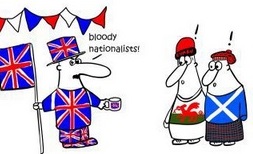
Patriotism was famously defined by George Orwell as passive admiration for one’s nation and that patriotism is based on peace, harmony, and equality. However, I am more interested in his thoughts on nationalism. The dictionary defines nationalism as “the strong belief that the interests of a particular nation-state are of primary importance. Also, the belief that a people who share a common language, history, and culture should constitute an independent nation, free of foreign domination.” Below is a description of nationalist behaviour and thought according to Orwell.
“All nationalists have the power of not seeing resemblances between similar sets of facts. A British Tory will defend self-determination in Europe and oppose it in India with no feeling of inconsistency. Actions are held to be good or bad, not on their own merits, but according to who does them, and there is almost no kind of outrage — torture, the use of hostages, forced labour, mass deportations, imprisonment without trial, forgery, assassination, the bombing of civilians — which does not change its moral colour when it is committed by ‘our’ side.”
These nationalist traits can be found in almost every nation that has ever existed. However, to each nation it is not nationalism but patriotism. Their citizens are absolved from the nationalist tag by virtue of their own nation’s perceived traditions, values and beliefs. The belief that it is only other nations or cultures which are capable of barbaric behaviour and that their country is above reproach. For example, their country is not capable of terrorism or war crimes. This is the case even when there are several examples of such behaviour, although it simply cannot be accepted. To do so would entirely invalidate their outlook, they criticise other nations in order to vilify them and to justify their superiority complex.

One has been labelled as patriotism, the other nationalism.
In the United Kingdom, one particular section of society exhibits these attributes best. In Scotland and Northern Ireland exists a way of life which is at odds with the rest of society. A religious belief and tradition which dates as far back as the sixteenth century, but with more emphasis on events of the late seventeenth century, namely Britain’s and the Netherland’s defence of the protestant faith against the papal threat of the Catholic King Louis XIV of France. However, more important in Scotland and Northern Ireland was the 1688 “Glorious Revolution”, which saw Catholic King, James VII and II of Scotland and England deposed of his throne. The English invited Prince William of Orange, husband to James’ Protestant daughter Mary to jointly take the throne of Scotland and England. James raised an army but was routed in 1690 by a force made up of Scots, Irish, and English troops. James’ attempt to take back his throne was undone on the river Boyne. The battle was framed in a Catholic versus Protestant fashion, it was a victory against popery. Out of these events emerged the Orange Order (OO) who every year commemorates the battle of the Boyne by marching through the streets of Northern Ireland and Scotland. This is by no means a concise history of the era and there are many more facets to the events described above.
Their ideology is still stuck in 1690, they still perceive a Catholic threat against their Protestant way of life and are willing to defend it, violently if needed. Followers of Williamite doctrine have attached themselves to Rangers Football Club, an organisation with a strong Protestant identity. I should say that being a Rangers fan is not synonymous with the OO, in fact the majority of fans, seemingly, do not identify with them at all. Many fans actually despise what they stand for and see them as having no part in a modern, civilised society. We are the people (WATP) a football chant which can be heard at most Rangers FC games, home or away, will also be emblazoned upon banners that surround OO marches. It is more than just a football chant, it sends a clear message, which is that those who chant it believe themselves to be the chosen people, the true protestant followers and defenders of Great Britain. They believe that white, Anglo-Saxon Protestants are a superior breed, the chant is nothing more than master race rhetoric.

George Square in Glasgow the day before. A carnival like atmosphere.
The events witnessed in Glasgow on September 19, 2014, which were carried out by pro-unionists, was not an example of patriotism, instead it was sheer hatred, largely based upon religious extremism. “NO SURRENDER” they shouted. “WE ARE THE PEOPLE” they chanted. “THIS IS OUR COUNTRY” they spewed. Patriots do not burn flags, patriots can accept and tolerate the differences of others. Nationalists, however, do burn flags, nationalists cannot accept different views or criticisms. The SNP and Yes voters were accused of being nationalists, not only from mindless bigots, but from people in positions of power. Politicians, celebrities and business owners fueled the vilification of yes supporters while ignoring the extreme nationalism of no campaigners.

British nationalists spewing religious extremism.
It is my firm belief that this type of behaviour is the cause of a large amount of hatred still prevalent in Scotland and Northern Ireland. It is religious extremism, dressed up as nationalism, but desguised as patriotism. The type of hatred spewed by these people do not belong in a modern, harmonious and civilised society. Orwell’s definition of patriotism does not fit in with Williamite ideology. However, this thought process has seen a massive rise in England with hate groups such as the English Defence League, political parties such as UKIP and the BNP, and the white supremacist group the National Front. These groups eschew nationalist thinking while calling themselves patriots.
Peace and love fellow human.




